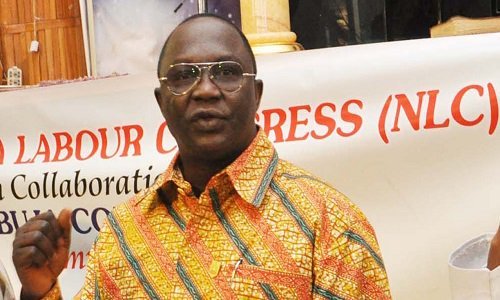Nigeria News
Minimum wage: NLC Speaks On Issuing Strike Notice

President of the Nigeria Labour Congress (NLC), Comrade Ayuba Wabba has said that the Congress is yet to issue any strike notice with regards to the implementation of the new national minimum wage by the government.
Naija News reports that Wabba revealed that discussion over the implementation of the minimum wage and the consequential adjustment was going on smoothly.
The NLC president pointed out that when the time comes for a strike ultimatum, Nigerians will be informed accordingly.
Wabba in a statement obtained by Naija News on Tuesday commended President Muhamadu Buhari for signing the Africa Continental Free Trade Agreement. He noted that the organized Labour were initially against Nigeria signing the agreement because there was no consultation.
He disclosed that only Nigeria and South Africa carried out extensive consultation on the agreement, adding that the observations of organised labour have been reflected in the agreement, part of which is that goods to benefit from the trade agreement must be produced in Africa.
He said “our own case is going on well. We met with our unions yesterday. The difference right now is about the consequential increase and we hope that through a normal process of dialogue, we will be able to sought that out.
On the strike alert already issued, he said; “no, we don’t work with that, please. NLC, as an organised body, I am not sure we have given any notice to that effect. If we reach a point of issuing threats, we will do that without hesitation.
“But I have seen much information on social media. We are a credible organisation and we should be able to speak for ourselves.
” If we get to that point, we will be able to inform you. But for now, the process is going on and we have been able to expand the scope of dialogue to include NLC/TUC and only limited to the unions in the public sector”.
While speaking on the benefit of the Africa Continental Free Trade Agreement recently signed by President Muhammadu Buhari, Wabba said organised labour was initially against Nigeria signing the agreement because there was no dialogue among the social partners in how it will benefit the country especially workers.
His reaction of words on the agreement red in parts; “We were against it because there was no consultation and nobody even knew the content. I can say with nostalgia that it is only Nigeria and South Africa that did the type of consultation we did. Through our engagement process, there was dialogue, there was consultation with key stakeholders in the economy and we were able to identify way to improve and key into the Africa Continental free Trade Agreement and to have a comparative advantage.
“Part of what we agreed on is that those goods must be made in Africa. They must be goods we produce in Africa that will be used for the trade among ourselves. In the course of the dialogue, we found out that trade among African countries is less than 16 per cent. Therefore, it will be an advantage for African countries to trade among themselves than trading with other countries.”




